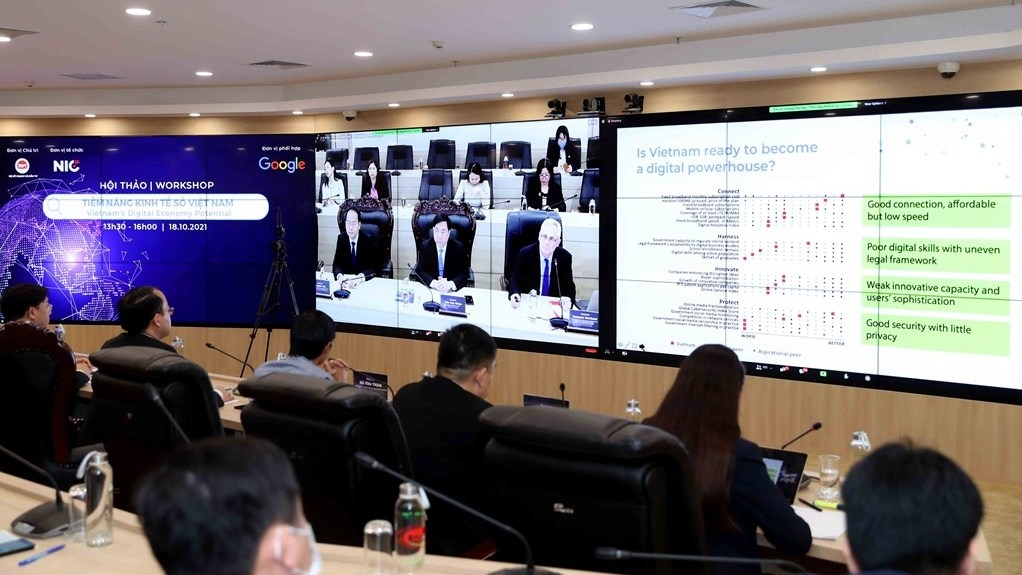Digital technology projected to earn US$74 billion for Vietnam by 2030: Seminar
Digital technology, if exploited to the maximum, can bring over VND1.733 quadrillion (US$74 billion) to Vietnam by 2030, with the most beneficial sectors including manufacturing, agriculture and food, and education training.

At the event (Photo: VNA)
The information was unveiled in a report on the potential of Vietnam’s digital economy, which was presented at a workshop held in Hanoi on October 18.
Conducted by strategic economics consultancy company AlphaBeta, the report showed that Vietnam has many opportunities to benefit from the digital economy.
The report showed that Vietnam has many opportunities to benefit from the digital economy. Accordingly, the young, educated, and tech-savvy population accounts for 70% of its citizens under 35 years old. The literacy rate in the 15-35 age group is over 98%, higher than the average global rate of 91%. About 70% of the population uses smartphones. Vietnam also has the second-fastest-growing Internet economy in Southeast Asia after Indonesia. The government has collaborated with private players to organise online training and capacity-building programmes in technology, e-commerce applications, and digital transformation for domestic businesses. Officials claimed that the government plans to build and implement more programmes to support innovation in local enterprises.
The report also pointed out a number of barriers in exploiting the benefits of digital technology, including regulatory requirements, digital connectivity, and a shortage of digitally skilled human resources. Co-organised by the Ministry of Planning and Investment’s Vietnam National Innovation Centre (NIC) and a private tech giant, the workshop reviewed the current situation and possible developments of Vietnam’s digital economy, as well as mechanisms and policies to promote its growth.
Co-organised by the Ministry of Planning and Investment’s Vietnam National Innovation Centre (NIC) and Google, the workshop reviewed the current situation and possible development of Vietnam's digital economy, as well as mechanisms and policies to promote its growth.
Speaking at the event, Deputy Minister of Planning and Investment Tran Duy Dong said in the context of being severely affected by the COVID-19 pandemic, Vietnam needs to accelerate the digital economy's development on the basis of science technology and innovation to improve the quality of life, productivity, efficiency and competitiveness.
World Bank Lead Economist for Vietnam Jacques Morisset recommended that it is necessary for Vietnam to focus on upgrading digital skills for workers, encouraging businesses’ innovation, and enhancing the accessibility and quality of information.
NIC Director Vu Quoc Huy said the centre has cooperated with partners such as Google and Amazon to organise online training and capacity building programmes in technology, e-commerce application, and digital transformation for domestic businesses.
He noted the building and implementation of more programmes to support innovation for businesses will be done in the time to come.
Vietnam has been witnessing rapid growth in information communication technology development. It aims to be among the top 50 countries in the ICT Development Index as early as 2025, and its digital economy is hoped to account for one-third of the country’s GDP by the end of the decade, instead of only 5%. For Vietnam, COVID-19 was a significant driving factor for digital transformation. Since the pandemic hit, the country has witnessed a great change in the application of new digitisation tools in both the private and public sectors. It is estimated that in June 2021, about two-thirds of private enterprises in Vietnam had access to technologies related to the digital economy. This is a huge leap from the pre-COVID-19 period. In the short term, Vietnam can take advantage of the presence of many famous technology enterprises to learn and improve digital skills for local labourers working for these corporations. The Vietnamese government can issue a series of initiatives to attract talents from expatriates working in digital technology fields around the world.
Other Posts
- FDI disbursement in Vietnam hits record high
- 10 outstanding events of Vietnam's economy in 2023
- Improve efficiency from FTA agreements
- Budget revenue exceeded plan
- Economy 2023, forecast 2024: Vietnam's economy through the perspectives of international experts
- Experts emphasize the human factor when Vietnam develops the Digital Economy
- World Bank: 2023 is a "resilient" year for Vietnam's economy
- Approve the Planning for exploration, exploitation, processing and use of minerals as construction materials
- Enhance international integration capacity
- It is forecasted that international flight passengers will increase and domestic flights will decrease


